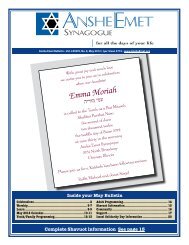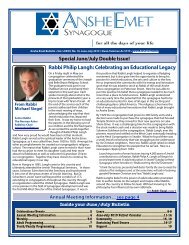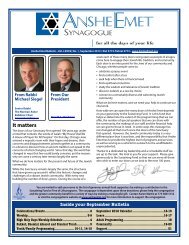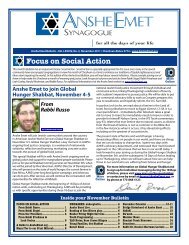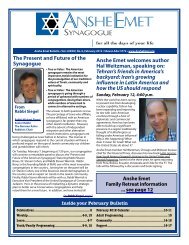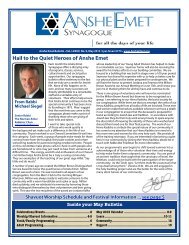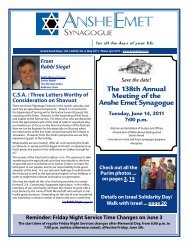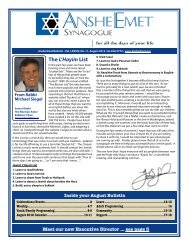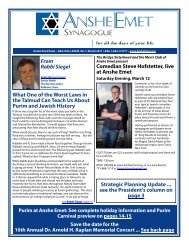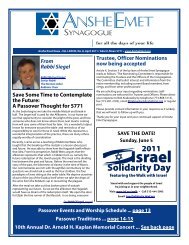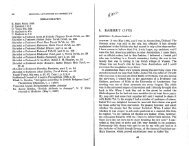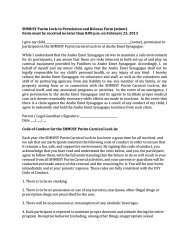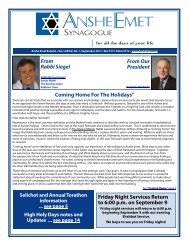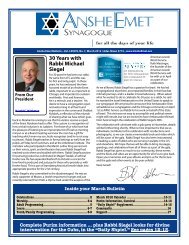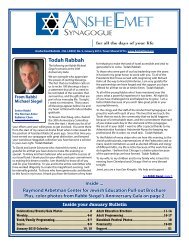(20a) Shev ve-al ta'aseh - Anshe Emet Synagogue
(20a) Shev ve-al ta'aseh - Anshe Emet Synagogue
(20a) Shev ve-al ta'aseh - Anshe Emet Synagogue
Create successful ePaper yourself
Turn your PDF publications into a flip-book with our unique Google optimized e-Paper software.
Rashi, Berachot 19b<br />
France, 1040-1105<br />
Or for his sister. What does this teach us? -<br />
Regarding a Nazir it is written, The whole time of<br />
his dedication to Hashem, he sh<strong>al</strong>l not go near a dead<br />
person, and immediately following it is for his<br />
father, or for his mother, for his brother, or for his<br />
sister -- he may not become impure - <strong>al</strong>l of which<br />
were included in the gener<strong>al</strong> rule, he sh<strong>al</strong>l not go<br />
near a dead person!<br />
So why were they specified? For his father [he is<br />
prohibited from becoming impure] - but not for<br />
a Mitzvah Corpse.<br />
And for his mother. What does this teach us? It<br />
is not needed for a Mitzvah Corpse, as that is<br />
deri<strong>ve</strong>d from for his father. And they explained<br />
it in Sifrei: To teach that if this Nazir was [<strong>al</strong>so]<br />
a Kohen, and thus had two instances of<br />
holiness, he <strong>al</strong>so may not become impure for<br />
his mother, but he should become impure for a<br />
Mitzvah Corpse. [N.B.: Although Rashi cites<br />
Sifrei, this midrash actu<strong>al</strong>ly appears in Bemidbar<br />
Rabbah (Vilna ed.) 10.11 -ASF]<br />
And for his brother. What does this teach us? If<br />
he was the Kohen Gadol [who can not become<br />
impure e<strong>ve</strong>n for a relati<strong>ve</strong>] and <strong>al</strong>so a Nazir, he<br />
<strong>al</strong>so may not become impure for his brother,<br />
but he should become impure for a Mitzvah<br />
Corpse<br />
And for his sister. What does this teach us? If it<br />
is not on this subject, teach about one who was<br />
going to slaughter his Pesach sacrifice and<br />
circumcise his son - that he should become<br />
impure for a Mitzvah Corpse.<br />
“Sit and Do Nothing” is Different<br />
Babylonian T<strong>al</strong>mud, Berachot 19b-<strong>20a</strong><br />
c sung yh ;s ,ufrc ,fxn h"ar<br />
- rnuk sunk, vn u,ujtku<br />
ch,f rhzbc<br />
lhnxu 'tch tk ,n apb kg wvk urhzv hnh kf<br />
tnyh tk u,ujtku uhjtk untku uhctk vhk<br />
/uhv tch tk ,n apb kg kkfc uvkuf tvs ovk<br />
/vumn ,nk yrp - uhctk ?utmh vnku<br />
tk vumn ,n ouan 'rnuk sunk, vn untk<br />
hrpxc vhk harsu /tepb uhctkns 'lhrymht<br />
h,a vhkg uuvs 'ivf vz rhzb vhv ota sunkk<br />
kct 'tnyh tks tuv untk 'tuv ;t ,uause<br />
/vumn ,nk tuv tnyn<br />
kusd ivf vhva hrv 'rnuk sunk, vn uhjtk<br />
kct 'tnyh tk uhjtk tuv ;t 'rhzb tuvu<br />
/vumn ,nk tnyn<br />
'vzk ihbg ubht ot 'rnuk sunk, vn u,ujtku<br />
kunku ujxp ,t yujak lkuva hnk ihbg uvb,<br />
/vumn ,nk tnyna - ubc ,t<br />
Rabbi Abe Friedman 2 afriedman@ansheemet.org<br />
www.facebook.com/rabbiabe



